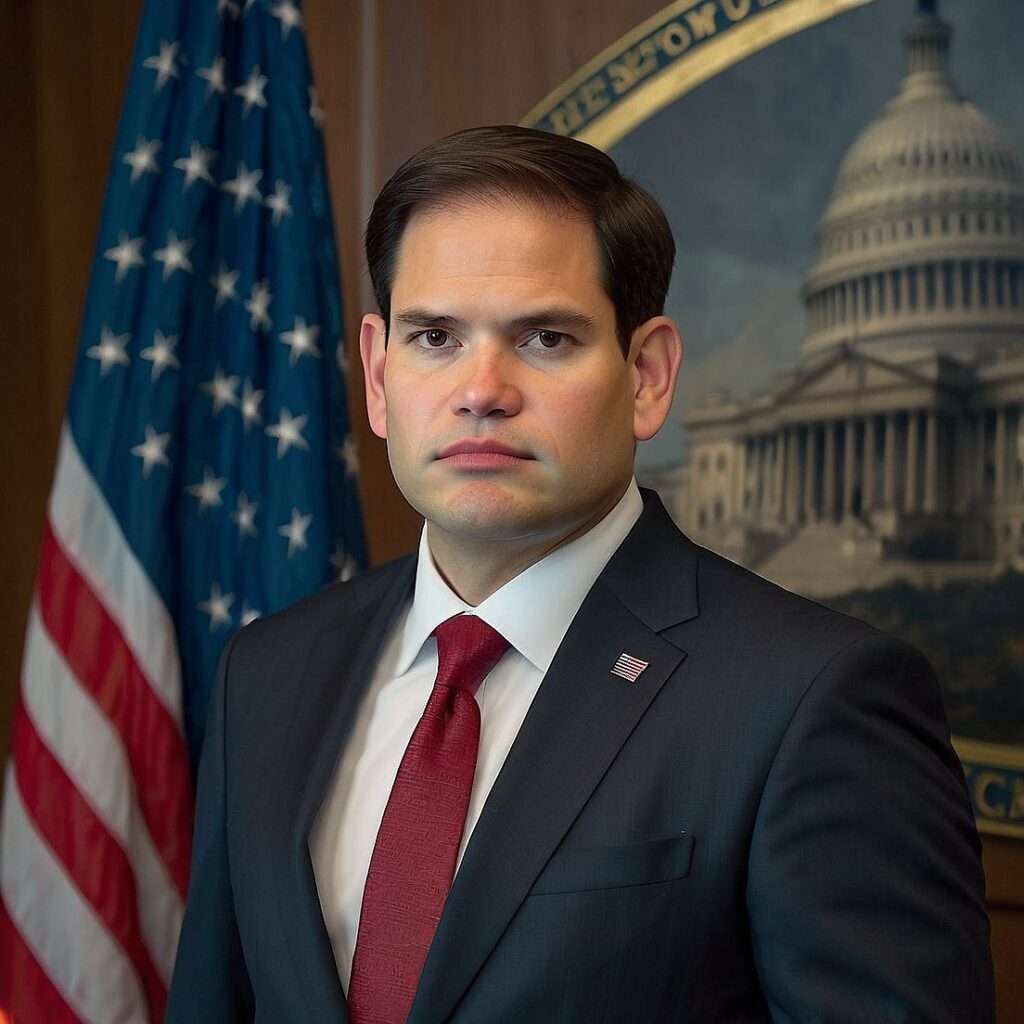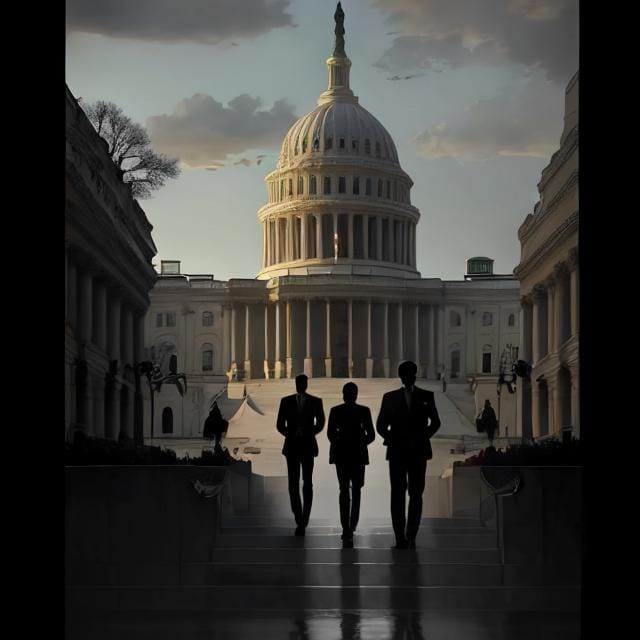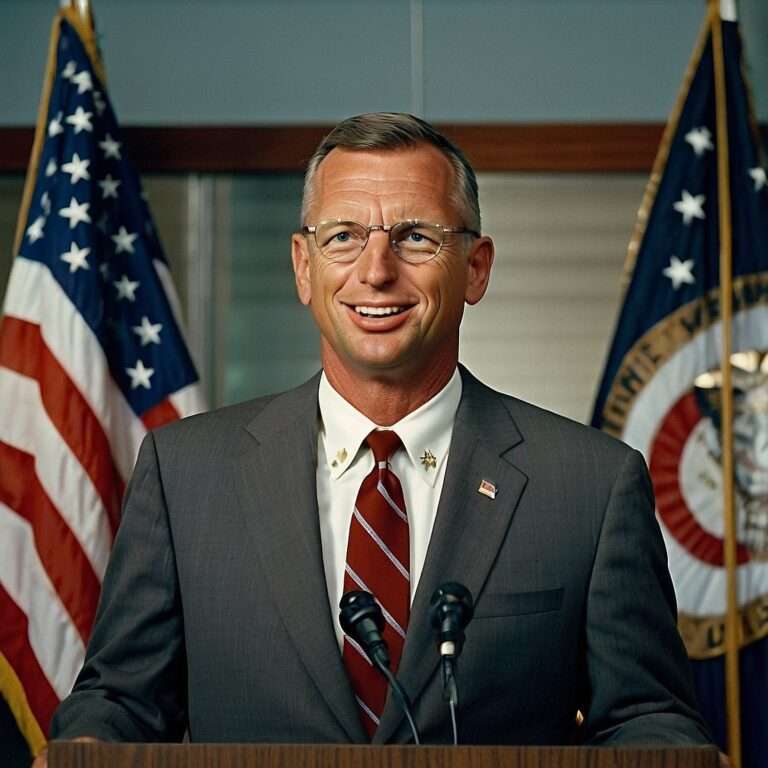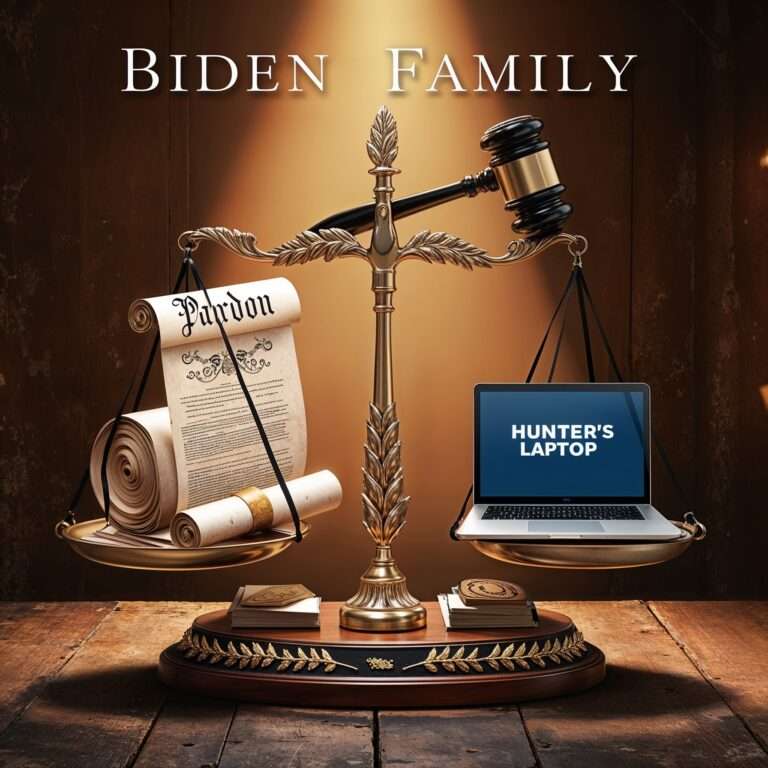
Marco Rubio, nominee for Secretary of State, posed in front of the U.S. Capitol and a globe, reflecting his focus on diplomacy and global relations.
Marco Rubio: A Hawkish Vision for Secretary of State
The role of Secretary of State demands diplomatic finesse, strategic restraint, and an ability to navigate complex global relationships. However, Marco Rubio’s neoconservative ideology and hawkish approach suggest he may not embody these critical qualities. If appointed as Secretary of State, Rubio could adopt a militaristic stance, potentially escalating global tensions rather than fostering cooperation. This analysis examines Rubio’s suitability for the role and the potential risks his appointment could pose to U.S. foreign policy.
What Does the Secretary of State Do?
The Secretary of State is the top diplomat of the United States, responsible for shaping and implementing foreign policy. The responsibilities include:
- Advising the President on Foreign Policy
Providing expert guidance on international relations, assessing global threats, and shaping the strategic direction of U.S. diplomacy. - Managing U.S. Relationships with Foreign Nations
Building and maintaining alliances, addressing conflicts, and fostering economic and cultural ties. - Representing U.S. Interests Internationally
Advocating for U.S. policies at international organizations like the United Nations and during bilateral negotiations. - Protecting National Security through Diplomacy
Preventing conflicts by promoting peaceful solutions to global disputes. - Overseeing U.S. Embassies and Consulates Worldwide
Ensuring diplomatic missions function effectively to protect U.S. citizens and advance national interests abroad.
These responsibilities require a delicate balance of diplomacy, strategic foresight, and flexibility—traits that are not typically associated with Marco Rubio’s foreign policy record.

Why Marco Rubio is a Poor Fit for Secretary of State
1. Limited Diplomatic Experience
Marco Rubio’s experience in foreign policy has been primarily legislative, focusing on sanctions and intervention rather than direct diplomacy. Unlike previous Secretaries of State such as John Kerry or Madeleine Albright, Rubio lacks experience negotiating high-stakes international agreements.
- Lack of Negotiation Skills: Rubio has not demonstrated the ability to build trust and navigate compromises with foreign leaders, a critical skill for effective diplomacy. His hawkish rhetoric could hinder collaboration and erode goodwill among U.S. allies.
- Comparison to Proven Diplomats: Diplomats like John Kerry brokered complex agreements, such as the Iran nuclear deal, through patient negotiation and strategic compromise—qualities Rubio has not showcased.
Strengthened Argument:
“Marco Rubio’s limited diplomatic experience risks undermining U.S. credibility on the global stage. His legislative background lacks the hands-on diplomacy needed to build alliances and resolve conflicts, raising doubts about his suitability for the nuanced demands of Secretary of State.”
2. Neoconservative Ideology
Rubio’s neoconservative worldview prioritizes military intervention, regime change, and maintaining U.S. global dominance—often at the expense of diplomatic solutions.
- Support for Regime Change: Rubio has advocated for regime change in countries like Venezuela, Syria, and Iran. These policies have exacerbated humanitarian crises, as seen in Venezuela, where harsh sanctions deepened economic instability and worsened refugee flows.
- Rejection of Diplomacy: Rubio opposed the Iran nuclear deal, favoring punitive measures over diplomatic engagement. His rigid stance has escalated tensions and enabled Iran to expand its nuclear program, undermining U.S. security.
Strengthened Argument:
“Marco Rubio’s neoconservative ideology promotes intervention over diplomacy, as evidenced by his push for regime change in Venezuela and Iran. His unwillingness to engage adversaries diplomatically could heighten tensions and lead to further destabilization in volatile regions.”
3. Hawkish Foreign Policy Approach
Rubio’s aggressive posture toward adversaries like China and Iran demonstrates a preference for militaristic solutions over de-escalation.
- Escalation with China: Rubio supports economic decoupling from China and expanding U.S. military presence in the South China Sea. However, experts warn that this could provoke conflict with Beijing, increasing the risk of direct confrontations.
- Hardline on Iran: Rubio’s backing of maximum pressure sanctions has worsened U.S.-Iran relations, accelerating Iran’s nuclear ambitions and heightening the risk of conflict.
Strengthened Argument:
“Rubio’s hawkish foreign policy stance risks unnecessary confrontations. His support for expanded military presence in Asia could provoke conflict with China, while his hardline approach toward Iran undermines diplomatic pathways to de-escalation.”
4. Risk of Repeating 2016 Staffing Mistakes
Rubio’s appointment could mirror the 2016 Trump administration staffing missteps, where hawkish figures like John Bolton created internal conflicts and policy inconsistency.
- Comparison to John Bolton: Bolton’s interventionist policies clashed with Trump’s stated goals, undermining diplomatic efforts with North Korea and Iran. Rubio’s similar approach could create discord within the administration, leading to mixed signals and diminished credibility.
- Policy Inconsistency: The presence of hawkish advisors often resulted in contradictory policies, confusing allies and emboldening adversaries. Rubio’s appointment could exacerbate these challenges, weakening U.S. foreign policy cohesion.
Strengthened Argument:
“Appointing Marco Rubio as Secretary of State risks repeating Trump’s 2016 staffing errors. His hawkish tendencies could create internal conflicts, undermining the administration’s stated goals and complicating U.S. diplomacy at a critical time.”
Conclusion: A Risky Choice for Secretary of State
Marco Rubio’s hawkish worldview, limited diplomatic experience, and preference for military solutions over diplomacy make him a questionable fit for Secretary of State. His neoconservative ideology could escalate tensions with key adversaries like China and Iran, while his appointment risks replicating the internal discord seen in the Trump administration’s early years.
In an increasingly complex global landscape, the U.S. needs a Secretary of State capable of nuanced diplomacy and strategic restraint. Marco Rubio’s record suggests he may lack the flexibility and diplomatic skills necessary to succeed in this critical role.
DARWIN’s Take: Marco Rubio Secretary of State – A Diplomatic Gamble
Marco Rubio’s nomination as Secretary of State raises a crucial question: Can a neoconservative hawk lead a department built on diplomacy? Rubio’s rigid approach to foreign policy, marked by interventionism and an aversion to compromise, suggests he might view diplomacy as a battlefield rather than a platform for negotiation.
“Rubio’s hawkish tendencies could risk dragging the U.S. into avoidable conflicts while straining alliances critical to global stability.”
Rubio’s potential appointment could redefine U.S. foreign policy, but at what cost? His leadership might amplify global tensions and weaken trust among allies, highlighting the risks of prioritizing ideology over practical diplomacy.
The real question isn’t whether Rubio can lead but whether his approach is compatible with the demands of 21st-century diplomacy. If appointed, Rubio could leave a legacy that reshapes U.S. foreign policy—for better or worse.
Related Reading on Paranoid Prophet
For readers looking to explore similar topics, here are some insightful articles from Paranoid Prophet that dive into political appointments and their broader implications:
- Pete Hegseth: A Polarizing Pick for Secretary of Defense
An in-depth analysis of Pete Hegseth’s military background, his alignment with Trump’s agenda, and the potential risks and rewards of his leadership in the Pentagon. - Tulsi Gabbard’s Nomination for Director of National Intelligence: Reform or Risk?
Examining the unconventional choice of Tulsi Gabbard for DNI, focusing on her independence, transparency, and the challenges of reforming entrenched systems. - Matt Gaetz: The Controversial Candidate for Attorney General
A critical look at Matt Gaetz’s legal controversies and the implications of his potential role in reshaping the Department of Justice. - Trump’s Cabinet Picks: A Second-Term Vision or Political Gambit?
An overview of Trump’s second-term Cabinet nominations, analyzing how these choices reflect his political priorities and strategic goals. - Election Integrity and Voter ID Laws in 2024: How States Impact Outcomes
A deep dive into how voter ID laws influenced the 2024 election, with a focus on the balance between access and security.
Sources
- Trump Plans to Nominate Rubio for Secretary of State
Published by Politico on November 11, 2024, this detailed piece discusses Rubio’s potential as Secretary of State and its implications for U.S. foreign policy. - Trump Taps Marco Rubio as Secretary of State
Published by Foreign Policy on November 12, 2024, the article examines the challenges Rubio may face if confirmed and the broader impact on global diplomacy. - Trump Says He’ll Nominate Sen. Marco Rubio to Be Secretary of State
Published by CBC News on November 13, 2024, this report provides insights into the political reactions and controversies surrounding Rubio’s nomination.
FAQ: Marco Rubio Secretary of State
Q: Who is Marco Rubio, and why is he considered for Secretary of State?
A: Marco Rubio is a U.S. Senator from Florida known for his neoconservative foreign policy stance and hawkish views. His candidacy for Secretary of State stems from his high-profile role in shaping legislative foreign policy and his alignment with interventionist strategies.
Q: What are Marco Rubio’s qualifications for Secretary of State?
A: Rubio has served on Senate committees dealing with foreign relations and national security, providing him with a legislative perspective on U.S. diplomacy. However, he lacks direct diplomatic experience, raising concerns about his ability to manage complex international relationships.
Q: Why is Marco Rubio considered a poor fit for Secretary of State?
A: Critics argue Rubio’s hawkish foreign policy approach, support for regime change, and lack of diplomatic experience could escalate global tensions. His rigid stance on issues like Iran and China conflicts with the nuanced diplomacy required for this role.
Q: How does Marco Rubio’s neoconservative ideology influence his foreign policy?
A: Rubio’s neoconservative ideology emphasizes military intervention, American dominance, and regime change. This approach often prioritizes punitive actions over diplomatic solutions, as seen in his positions on Venezuela, Syria, and Iran.
Q: What are the risks of Marco Rubio’s hawkish stance on global conflicts?
A: Rubio’s aggressive foreign policy could provoke unnecessary confrontations, especially with nations like China and Iran. His call for increased U.S. military presence in the South China Sea and support for “maximum pressure” campaigns risks destabilizing international relations.
Q: How does Marco Rubio’s experience compare to past Secretaries of State?
A: Unlike experienced diplomats such as John Kerry or Madeleine Albright, Rubio’s background is primarily legislative. His lack of negotiation experience may hinder his ability to foster trust and cooperation with foreign leaders.
Q: What is the impact of Marco Rubio’s stance on the Iran nuclear deal?
A: Rubio opposed the Iran nuclear deal (JCPOA) and advocated for harsh sanctions. This stance escalated tensions and led Iran to expand its nuclear program, highlighting the potential consequences of his rejection of diplomatic solutions.
Q: Could Marco Rubio’s appointment echo Trump’s 2016 staffing mistakes?
A: Yes, Rubio’s hawkish approach mirrors the influence of figures like John Bolton, whose hardline policies often clashed with Trump’s goals, leading to inconsistent and counterproductive foreign policy outcomes.
Q: What challenges might Marco Rubio face during Senate confirmation as Secretary of State?
A: Rubio’s controversial positions on regime change, his neoconservative ideology, and lack of diplomatic experience could lead to opposition from both Democrats and moderate Republicans during the confirmation process.
Q: How might Marco Rubio’s appointment affect U.S. diplomacy?
A: Critics warn that Rubio’s interventionist tendencies could strain alliances and increase the risk of military conflicts, undermining the core diplomatic mission of fostering peaceful international relationships.


